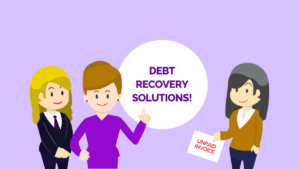When dealing with debt collection, it’s essential to understand both your rights and the practices that reputable agencies use to ensure fair treatment. The debt recovery process can be challenging, particularly if you’re unsure about the laws surrounding debt collection, the rights of creditors and debtors, and the steps involved in a fair debt recovery process. At Shergroup, we believe in the importance of fair treatment for all parties involved, and our team operates with respect, transparency, and professionalism.
In this guide, we’ll walk you through key elements of debt collection, recent regulatory changes in the UK, and our commitment to ensuring that your rights are protected. We’ll also highlight Claire Sandbrook’s expertise and how her experience from shows like “Can’t Pay? We’ll Take It Away!” and “Call the Bailiffs | Time to Pay Up“ shapes our approach at Shergroup.
1. The Role of Debt Collection Services
Debt recovery agencies play a critical role in helping businesses recover unpaid funds while maintaining professional and respectful practices. Debt collection, especially in the UK, is governed by strict regulations to protect both creditors and debtors. Shergroup, as a High Court Enforcement Group, ensures that our High Court Enforcement Officers (HCEOs) are trained in these regulations, ensuring a fair, balanced approach to every debt recovery case.
2. The Regulatory Landscape for Debt Collection in the UK
In recent years, the UK has introduced several regulatory updates to ensure fairer treatment in debt recovery. For instance, The Financial Conduct Authority (FCA) has issued specific rules on how debts should be collected, especially when dealing with vulnerable individuals. In addition, the Consumer Credit Act lays out essential guidelines on what is permitted, including timelines, debtor rights, and what constitutes fair treatment.
The UK Statute of Limitations also impacts debt recovery, as it dictates the time limits within which creditors can legally recover debts. For most unsecured debts, this limit is six years in England and Wales, meaning if no payment or acknowledgement has been made within this period, the debt may be considered statute barred. Shergroup’s professional debt recovery services always take these timeframes and regulations into account.
3. Fair Debt Collection and the Importance of Transparency
Transparency is a cornerstone of ethical debt collection. At Shergroup, we prioritise clear communication, letting debtors know their rights, their obligations, and the steps they can take to manage the debt. Our goal is to resolve debt disputes amicably whenever possible, which means we offer debtors flexible payment plans, open discussions, and clarity on the debt collection process.
When it comes to High Court Enforcement, Claire Sandbrook’s extensive experience, especially from her time on popular TV shows like “Can’t Pay? We’ll Take It Away!” and “Call the Bailiffs | Time to Pay Up,” has shaped her understanding of the importance of respectful engagement and fair treatment in enforcement. Her leadership has inspired our team to operate with empathy and professionalism.
4. How High Court Enforcement Works
When traditional methods of debt recovery do not work, creditors may opt to escalate their claims to High Court Enforcement, which involves obtaining a High Court Writ. This legal document allows High Court Enforcement Officers (HCEOs) to recover debts above £600, such as County Court Judgments (CCJs), providing creditors a solution when other methods fall short.
The High Court Enforcement Process
Our process begins with a thorough assessment of the debt case to ensure that all procedures are aligned with current laws and regulations. Shergroup’s HCEOs follow each step of enforcement carefully, from initial notice to property visits, all while adhering to a strict code of conduct that prioritises fair treatment.
5. Steps We Take to Ensure Fair Treatment
At Shergroup, fairness and professionalism guide our approach. Here’s how we maintain the highest standards in debt collection and High Court Enforcement:
Clear Communication
We ensure that debtors fully understand the nature of the debt, the amount due, and the legal grounds of the claim. We provide ample notice and offer flexible payment arrangements whenever possible.
Professionalism and Respect
Our HCEOs undergo extensive training to manage debt recovery situations respectfully, using Claire Sandbrook’s principles of compassionate enforcement as their guide.
Following Regulatory Guidelines
Every step in our debt recovery process complies with the latest debt recovery regulations in the UK. Our adherence to these guidelines reflects our commitment to ethical practices.
6. Your Rights in the Debt Collection Process
If you’re facing debt recovery actions, you have several rights that reputable debt recovery agencies must respect:
Right to Information
Debtors have the right to receive clear information about the debt, including the amount owed, details of the creditor, and the steps they can take to resolve it.
Right to Fair Treatment
Regulations mandate that debt recovery agencies treat debtors fairly and respectfully, particularly if the debtor is in a vulnerable situation.
Right to Challenge
If you believe the debt claim is incorrect or if the amount is disputed, you have the right to challenge it. Shergroup provides resources and assistance to ensure your concerns are heard and addressed.
7. Recent Changes in UK Debt Recovery Law
The debt recovery landscape in the UK has evolved significantly, with regulatory bodies introducing new guidelines and rules. These changes aim to create a fairer debt recovery process, especially for individuals in financial distress. Some of the recent updates include:
Tighter Rules on Contact
Debt recovery agencies are restricted in how often they can contact debtors, protecting individuals from undue stress.
Enhanced Support for Vulnerable Individuals
Agencies must now have protocols to identify vulnerable debtors and offer them additional support.
Clearer Guidelines for CCJs and Debt Statutes
The UK Statute of Limitations and CCJ guidelines have been clarified, ensuring that agencies do not pursue debts past the legal limit.
These regulatory updates align with Shergroup’s values and commitment to responsible debt recovery, and our team is well-versed in the latest requirements to ensure compliance and fairness.
8. Frequently Asked Questions on Debt Collection and Enforcement
Q: Can debt collection agencies take you to court?
Yes, if traditional recovery methods fail, debt collection agencies may seek legal action, such as a County Court Judgment (CCJ). At Shergroup, we first try to resolve issues outside of court, but, if necessary, our team is prepared to guide creditors through the legal process.
Q: How much do debt collection agencies charge?
The cost of debt collection depends on factors like the amount owed, the complexity of the case, and the agency’s fee structure. Shergroup offers transparent pricing, ensuring clients understand all associated costs before proceeding.
Q: What is the Statute of Limitations on Debt in the UK?
In the UK, the statute of limitations for most unsecured debts is six years. After this period, the debt may be considered statute-barred, and creditors typically cannot take legal action.
9. Contact Shergroup for Professional Debt Collection Services
Shergroup’s debt recovery services provide a solution for individuals and businesses facing debt challenges while ensuring fair and respectful treatment. If you’re dealing with unpaid debts, need guidance on High Court Enforcement, or want to know more about the debt recovery process, our team is here to help. You can benefit from the extensive experience of Claire Sandbrook and her dedicated team, who understand the nuances of debt collection and prioritise fair treatment.
Visit Shergroup.com to learn more about our debt collection services or get in touch with our team for assistance.





